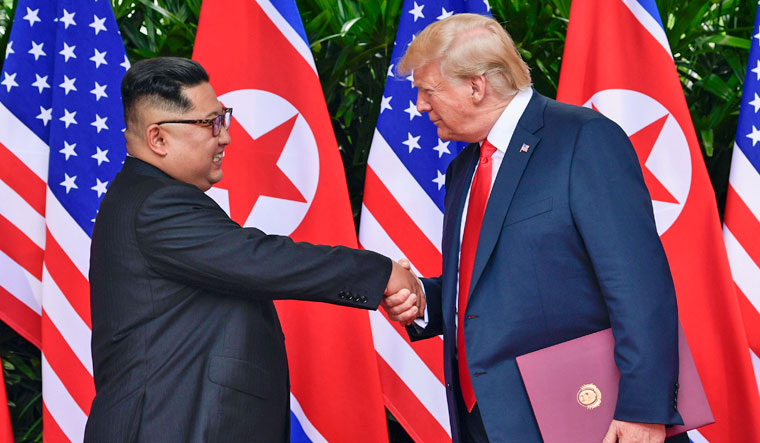The North Korean talks process with the US and the South is sidelining the human rights of Pyongyang's oppressed citizens, the UN's top official on the issue said today.
In a whirlwind of diplomacy, the leader of the isolated, nuclear-armed North Kim Jong Un held an unprecedented summit with US President Donald Trump in Singapore last month, after two earlier meetings with the South's Moon Jae-in.
It was a marked contrast to the mutual threats and mounting fears of last year, instead raising hopes of reaching a deal over North Korea's arsenal, which include nuclear bombs and missiles capable of reaching the US mainland.
But Pyongyang remains accused by many—including the UN—of a litany of rights abuses against its population.
Neither the joint statement issued by Trump and Kim in Singapore, nor the earlier Panmunjom Declaration signed by Kim and Moon, mentioned the issue of human rights.
"It seems that those who are negotiating are losing sight of this important thing, which is would this process benefit at the end the people living in North Korea," said Tomas Ojea Quintana, the United Nations' Special Rapporteur on human rights in the North.
Instead Washington and Seoul were prioritising their own concerns, he said.
"In principle the interests that the president of the United States has shown is that they want to denuclearise North Korea so their territory is not in danger, and that of course is something that has to do with their own interests," Ojea Quintana told AFP in Seoul.
"I'm still trying to understand to what extent human rights was raised" by Trump in Singapore, the Argentinian lawyer added.
"It seems that it was not comprehensively addressed." He was particularly concerned, he said, by Trump's remarks that the focus should be on the future rather than the past.
"Those are not the kind of statements that we those who advocate for human rights would like to hear," he said, "especially from someone who is negotiating with the leadership" of North Korea.
In the Singapore statement, Kim signed up to a vague commitment to work towards "complete denuclearisation of the Korean Peninsula", but Pyongyang has long seen that as a lengthy process of undefined multilateral disarmament, rather than a unilateral dismantling of its own weapons.
Secretary of State Mike Pompeo was in Pyongyang at the weekend to try to flesh out the process, only for the North to warn that it was being jeopardised by overbearing "gangster-like" US demands.
Pompeo shrugged off the accusations, insisting the talks were being conducted in "good faith" and making progress, and adding sanctions would only be lifted with "final" denuclearisation.
Sanctions targeting the broader North Korean economy were incompatible with human rights and should be lifted, said Ojea Quintana.
He is currently visiting the South—he has been unable so far to travel to the North—and said Seoul officials had told him that while they were still committed to the issue of human rights in the North, "for the time being it is not a priority for them".
The Moon talks have been followed by a flurry of meetings on cross-border projects in spheres from railways to forestry, yet Ojea Quintana said there was no indication so far that the inter-Korean rapprochement would benefit the people of North Korea.
But rights were interconnected with denuclearisation and peace, he added.
A UN commission of inquiry found in unequivocal terms in 2014 that "crimes against humanity had been and were being committed" in the North.
The situation had not improved, said the UN special rapporteur.
"The whole socialist system collapsed some time ago," he said. "What has collapsed is the services part of the socialist system, it's not providing any more services. But what is still in place is this system of control and surveillance and detention of the population.
"Serious human rights abuses are being committed and those responsible are the government and the leadership."
The North's demand for security guarantees as part of the negotiations process should not lead to impunity for the guilty, he added—but acknowledged that it was a difficult issue to raise at present.
"You should not avoid reviewing the past, you should not avoid holding those responsible to account."

